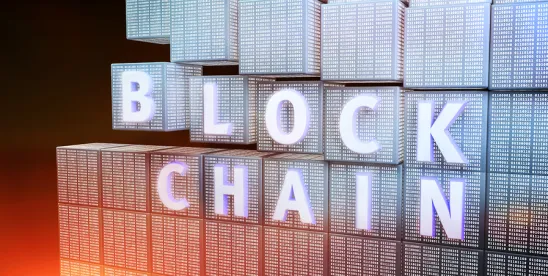There is a lot of buzz around blockchain technology and its potential to revolutionize a wide range of industries from finance and healthcare to real estate and supply chain management. Reports estimate that over $1.4 billion was invested in blockchain startups in 2016 alone, and many institutions and companies are forming partnerships to explore how blockchain ledgers and smart contracts can be deployed to manage and share data, create transactional efficiencies, and reduce costs.
Illinois Moving Forward with Blockchain Pilots
-
The Illinois Blockchain Initiative (“IBI”), which was formed to study applications of blockchain technology for government services, is moving ahead with five pilot programs. According to a recent article, the pilots selected by the IBI will study how blockchain technology can be used in the following five areas: (1) property deed recording: (2) validating academic credentials; (3) creation of a single state-wide health provider registry; (4) securing vital records (beginning with birth certificates); and (5) creating a renewable energy credit marketplace.
-
The pilot making the most progress thus far is the property deed recording registry, which is being developed through a partnership with the Cook County Recorder of Deeds (“CCRD”). The goal of the pilot is to consolidate property information that is currently maintained across various government offices into a single shared ledger. According to a report issued earlier this year by the CCRD, preliminary findings indicate that the transition to a blockchain network could lead to enhanced liquidity, accuracy, immutability, and efficiency within the real-estate industry. Blockchain-based land registries could also help reduce development and due diligence costs for energy infrastructure projects that require significant land holdings and access rights.
-
However, the report also highlighted a number of hurdles, including heavy implementation costs and the need for multiple parties to “buy in.” The cost of replacing legacy systems is often cited as an obstacle to blockchain solutions, but the CCRD report concludes that “the payoff appears to be worth the effort.”
-
From an energy standpoint, the most notable pilot is the proposed renewable energy credit marketplace, which the IBI is working on in connection with the Illinois Pollution Control Board. The goal is to create an electronic credit system for renewable resources, which would allow for the recording, monitoring, and trading of green energy certificates. Accordingly to a business liaison for the IBI, the hope is that the use of blockchain technology will help to improve transparency, auditability, and reconciliation within renewable energy exchanges.
-
To date, Illinois remains at the forefront of states exploring potential applications of blockchain technology. It is likely that the lessons learned through the IBI pilot programs will provide valuable insight and serve as a potential roadmap for other states as they begin to study the use of blockchain technology.
Singapore: Latest Country to Develop a Regulatory Sandbox to Promote Energy Innovation
-
Singapore’s Energy Market Authority (“EMA”) is proposing the development of a regulatory sandbox to enable the energy industry to test new products and services. According to a consultation paper released by the EMA late last month, the goal is to encourage experimentation and innovation in the electricity and gas sectors so that “promising innovations can be tested in the market and have a chance for wider adoption in Singapore and abroad.”
-
Under the framework proposed, EMA would solicit proposals from applicants who would then deploy and operate the sandbox. Once deployed, the EMA would provide “regulatory support” by relaxing legal and regulatory requirements, which the applicant would otherwise be subject to for the duration of the sandbox.
-
By relaxing legal and regulatory requirements, the EMA hopes to both promote innovation in Singapore’s energy sector and assess the impact of new products and services prior to deciding how such products and services should be regulated. The EMA is hoping to attract technology firms and industry stakeholders looking to leverage technology in an innovative way or improve business and operational procedures in the electricity and gas sectors, making the sandbox an ideal fit for energy industry blockchain applications.
-
The EMA proposal is similar to an initiative announced by the UK’s Office of Gas and Electricity Markets (“OFGEM”) last February, which called for the creation of a regulatory sandbox to “allow innovators to trial business propositions that will benefit consumers without incurring all of the usual regulatory requirements.” The EMA and OFGEM initiatives are models for other energy regulators to consider when evaluating how to foster the development of blockchain and other new technologies in the energy sector.
LO3 Energy Developing Blockchain-Powered Microgrid Technology to Australia
-
We described the “Brooklyn Microgrid,” one of the first attempts in the United States to use blockchain technology to facilitate peer-to-peer energy trading. The company behind the development of that project, LO3 Energy, recently partnered with an Australian solar contractor and licensed energy supplier to develop a microgrid in South Australia that will use LO3’s peer-to-peer trading platform.
-
The initial project will include up to 6 MW of distributed solar generation. Each solar array will be equipped with a smart meter to measure and manage both input and output of electricity, and will be able to broadcast this information directly to the blockchain network.
-
The goal is to eventually couple each solar array with battery storage to create a reliable and secure distributed energy network. The partnership with a licensed energy supplier also allows LO3 to gain access to a broader marketplace of distributed energy resources.



 />i
/>i
